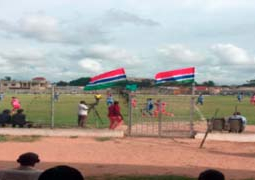Chief
Judge Justice Hassan B. Jallow yesterday launched the 2010-2012 Supreme Court
law reports, customary law and Sharia law publications, at a ceremony held at
the judiciary complex at Independence Drive in Banjul.
Justice
Jallow thanked the European Union for funding the justice and legal education
project, adding that the project aims to contribute to better democratic and
economic governance in The Gambia.
He
expressed the need for sustainability of the project, pointing out that he
looks forward to further collaboration with the European Union.
In
her opening remarks, Mrs Janet R. Sallah-Njie, a common law expert and the
project co-coordinator, said the project took a holistic approach of improving
all aspects of the tripartite justice delivery system in The Gambia.
She
said the project include, among others, supporting the judiciary through the
training of judges, magistrates, and cadis; supporting the traditional and
customary adjudicatory system through the training of Alkalolus, community
mediators, chiefs and members of the district tribunals, and supporting legal
education in collaboration with the Gambia Law School and the University of The
Gambia Faculty of Law.
Mrs
Sallah-Njie disclosed that in 2016, under the auspices of European Union
funded-project, the National Council for Law Reporting successfully published
two very important publications relating to jurisprudence under the tripartite
legal system.
The
publications included the maiden edition of the Supreme Court Law Reports
2014/2015, dedicated specifically to jurisprudence derived from the Supreme
Court, as the highest court in The Gambia, and report relating to the
jurisprudence of the Sharia Court i.e. the Sharia Law Report 2012/2015.
Mrs
Janet Sallah-Njie further said that the project also funded a series of
publication on customary law and Sharia law including Superior Court judgments
on customary law and procedure; Sharia jurisprudence in The Gambia; land tenure
dispute resolution and customary law; and customary law and usages of The
Gambia and interview with chiefs.
She
revealed that the law reports are the tools of trade of the practicing lawyer
and “these tools play a significant role in the development of the rule of
law”.
According
to her, the rule of law ensures that a country is governed by a definite set of
rules and that both the governors and governed and indeed the state are all
subject to law.
Justice
Awa Bah, chairperson of the National Council for Law Reporting (NCLR), thanked
the European Union for sponsoring the 2010-2012 edition of The Gambia Supreme
Court Law Reports.
The
European Union Access to Justice and Legal Education project in The Gambia
sponsored the publication of the maiden volume 2014-2015.
Justice
Bah said this second edition was a selected compilation of enriched judicial
pronouncements in fourteen judgments and three rulings covering a diverse range
of subject matters that would be of captivating interest to all.
She
expressed gratitude to Mrs Victoria Andrews, the editor of the 2010-2012
edition for her editorial vigour and meticulousness despite the very short time
frame within which to deliver.
She
also thanked Mrs Janet Sallah-Njie, the project co-coordinator, for her
determination, dedication and steadfastness.
Cherno
Marenah, the Solicitor General and Legal Secretary, who represented the
Attorney General and Minister of Justice, thanked the European Union for the
initiative in sponsoring the project.
He
said the launching of the 2010-2012 Suprme Court Law Reports and Customary Laws
and Sharia Laws could not have come at a better time and he pledge his
ministry’s support for the initiative.
Meanwhile,
a cheque of 10,000 euros was presented to Justice Awa Bah, the chairperson of
the National Council for Law Reporting, by the EU Ambassador to The Gambia.
The
ceremony was attended by the Speaker of the National Assembly, Hon. Mariam
Denton, judges, magistrates, cadis, senior officials of the judiciary, members
of the Gambia Bar Association, and the Inspector General of Police.


